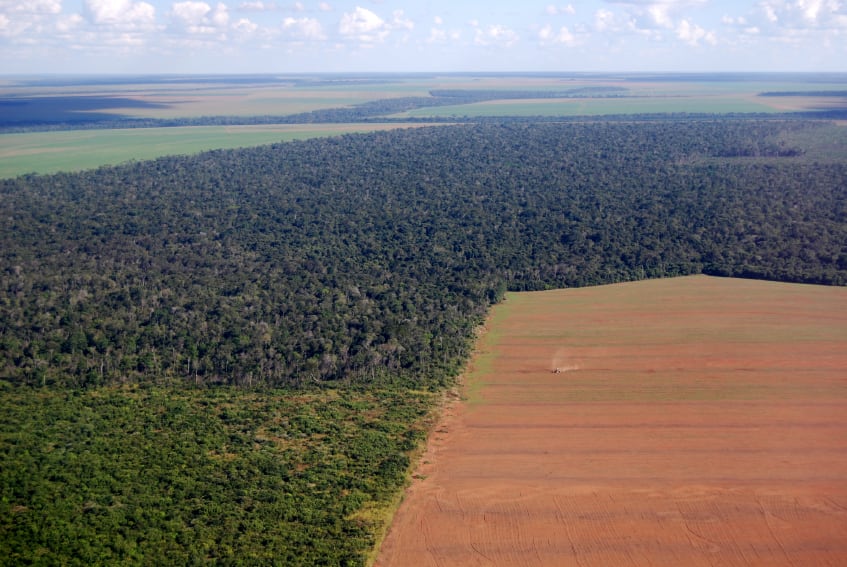Forests cover close to one-third of the planet’s ice-free land, yet millions of hectares are disappearing every year. In 2017 alone, 29 million hectares were lost. More than half were made up of biodiverse tropical forests.
When forests are cleared or burnt, they released carbon into the atmosphere – predominantly as carbon dioxide – which makes deforestation a primary contributor to climate change.
Globally, four commodities are considered most responsible for deforestation: timber products, palm oil, soy, and cattle products.
Many food and non-food items purchased in the UK contain such commodities. Palm oil, for example, features in at least 50% of all supermarket products. But how can we ensure that these ingredients are produced responsibly, and in accordance to relevant local laws?
UK consults on due diligence proposal
From a legal standpoint, we can’t. Businesses can of course voluntarily adhere to sustainable schemes that they set themselves, or to third-party certification bodies, such as the Roundtable on Sustainable Palm Oil (RSPO) and the Round Table on Responsible Soy (RTRS).
In the UK, due diligence may well be on its way to becoming mandatory. This week, the Department for Environment, Food and Rural Affairs (Defra) opened a consultation concerning proposed legislation that could see big companies fined for irresponsible supply chain sourcing.
“Our proposal would make it illegal for larger businesses to use forest risk commodities that have not been produced in accordance with relevant local laws, and they would need to take steps (undertake due diligence) to show that they have taken proportionate action to ensure this is the case,” noted Defra.
“This would set a clear requirement on businesses, and those who do not comply would be subject to fines. Our approach focusses on larger businesses as they have the influence to send a positive signal to producers.”
The proposed law was recommended by an independent taskforce called the Global Resource Initiative, established by Defra in 2019. In March this year, the Initiative submitted its final recommendations to Government, which included a recommendation for a mandatory due diligence requirement.
‘A step towards improving environmental governance’
The proposal has been well received by many. Mike Barrett, for example, who heads up Science and Conservation at WWF-UK, suggested the proposal mirrors consumer and business demand.
“It’s clear businesses and consumers don’t want imports that wreck the planet, drive deforestation in areas like the Amazon and lead to devastating fires,” he said.
“The government must now fast-track strong, effective laws that clean up our supply chains and show the UK can take the lead in tackling the global nature and climate crisis.”
Ruth Chambers from the Greener UK coalition said the consultation is a 'welcome first step' in the fight against deforestation.
“The evidence linking deforestation with climate change, biodiversity loss and the spread of zoonotic diseases is compelling. A new law is an important part of the solution and is urgently needed. The government’s flagship Environment Bill provides a timely vehicle to progress this.
“The proposal must now be tested thoroughly to ensure it will deliver the government’s domestic and international environmental leadership ambitions.”
And James Corlett, a partner at international law firm Fieldfisher, said the proposal is a step towards improving environmental governance in the UK and internationally.
“The supply chain is often a major risk area for businesses. Even before COVID-19, businesses were seeing more scrutiny from customers and regulators. Post-pandemic, there is more interest on where food products in particular are coming from, especially as shortages in the early days of lockdown prompted more people to shop locally.”
Corlett suggested ‘recent scrutiny’ on the impact some large companies are having on the environment may mean businesses are already ‘pushing the boundaries’ of legal and ethical practice. “While big business is not the only culprit, the focus of the proposed legislation on larger companies is appropriate, as the obligations should filter down through smaller suppliers.”
Businesses should start paying closer attention to their supply chains, he advised, which could help protect themselves legally and commercially, and/or redesign supply chains around these issues.
“By building in these controls at an early point, businesses can maintain margin growth while avoiding the need for heavy capital expenditure on reversing procedure or retraining.”





